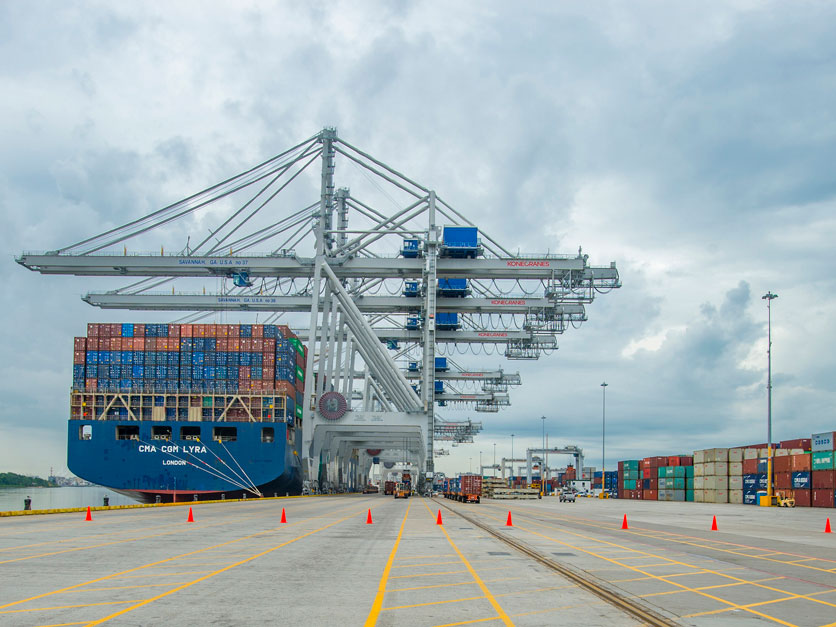The UK sent its top agriculture official to the U.S. this week in an effort to lay the groundwork for an eventual trade agreement with the U.S.
UK Secretary of State for Environment, Food and Rural Affairs George Eustice met with Agriculture Secretary Tom Vilsack as well as lawmakers, farmers and agribusiness leaders before returning to London Wednesday night.
“The long and short of it is (British Prime Minister Boris Johnson) and the UK government are still very keen to progress a UK-U.S. trade agreement,” Eustice said Wednesday at the British ambassador’s residence in Washington.
Eustice says the British are well aware that the Biden administration isn’t ready yet to begin negotiating new trade deals, but his government hopes that will change.
Scott talks ‘legislative fix’ coming for cattle markets
House Ag Committee Chairman David Scott, D-Ga., closed a hearing Wednesday with executives of the four largest meatpackers by saying the committee will consider legislation addressing cattle market reforms.
“I look forward to working with you as we develop the legislative fix to this great challenge,” Scott told the leaders of Cargill, JBS, National Beef and Tyson Foods.
He gave no indication of whether that “fix” would include the Senate bill sponsored by GOP Sens. Deb Fischer of Nebraska and Chuck Grassley of Iowa that would empower USDA to mandate cash trading on a regional basis.
The executives denied under oath Thursday that they had colluded to drive down prices paid to cattle producers.
By the way: Cattle producers could be facing another challenge in the coming months: A new report from CoBank says consumers may reduce their beef consumption as retail beef prices rise.
“The sharply higher costs for feed, energy and labor have yet to fully impact wholesale and retail meat prices, but that will soon change. And as consumers notice their dollar is not going as far as it used to, they may trade down at the meat case, with chicken being the primary beneficiary,” said Brian Earnest, lead animal protein economist for CoBank.
Cargill slammed over Black farmer initiatives
During Wednesday’s hearing, Republicans on the House Ag Committee challenged Cargill Inc. CEO David MacLennan over a program that pays a premium to Black farmers for cotton. Cargill started the program at the request of retail giant Target and plans to expand it to other minority farmers and women, MacLennan said.
“I hope you get sued over that,” Rep. Austin Scott, R-Ga., told him. “I think that’s illegal and unconstitutional.”
MacLennan insisted it’s fair to target assistance to minority farmers. “I don’t think white men are underrepresented in the farming industry today,” he said.
In a statement sent to Agri-Pulse after the hearing, Scott said “paying farmers different prices for products based solely on race is unfair and un-American.”
Railroads face heavy scrutiny from STB
Railroad executives faced a grilling by the Surface Transportation Board during the second day of emergency hearings Wednesday on service delays.
Representatives of the Union Pacific and BNSF blamed service disruptions on an inability to adequately staff after the pandemic, unanticipated, sky-high demand for trains and black swan events that caused supply shocks.
UP is considering metering cars to increase flow on its network and aggressively hiring to fill worker shortages. BNSF is positioning a surge fleet to handle an increase in shipments of ag commodities, something it’s already done for fertilizer deliveries.
The board’s take: STB Chairman Martin Oberman said he was “having trouble” accepting what he was hearing. He said the railroads assured the board a year ago that staffing issues would be handled.
The claim that “unanticipated demand” is a cause of the congestion fell short for Oberman, too. He cast doubt on how the demand could have been unanticipated and said other events like blizzards and forest fires should be anticipated.
Bottom line: Oberman suggested the railroads may be required to report weekly on their activities.
Farm groups seek delay in SEC rulemaking
Some 120 farm organizations are appealing to the Securities and Exchange Commission to provide more time to comment on its plan to require corporations to report on greenhouse gas emissions in their supply chains.
A proposed rule the SEC approved 3-1 in March would require publicly traded companies that have set goals for shrinking their carbon footprint emissions to start reporting on the progress they are making.
The proposed rule “may create multiple, new sources of substantial costs and liabilities,” the groups say in a letter to the SEC. “These include almost certain reporting obligations, technical challenges, significant financial and operational disruption and the risk of financially crippling legal liabilities.”
USTR hits EU food name restrictions
The Biden administration is maintaining opposition to the European Union’s efforts to spread across the globe protections for the names of European cheeses and other products.
“As part of its trade agreement negotiations, the EU pressures trading partners to prevent any producer, except from those in certain EU regions, from using certain product names, such as fontina, gorgonzola, parmesan, asiago, or feta,” the U.S. trade agency says in the latest edition of its annual Special 301 Report. “This is despite the fact that these terms are the common names for products produced in countries around the world.”
USTR says it’s particularly concerned about efforts by the EU to make it harder to file opposition arguments against Europe’s adoption of new name protections, known as geographic indications.
He said it. “By ensuring a legal and reliable agricultural workforce, we can secure our food supply, strengthening our national security and averting disaster.” – Rep. Dan Newhouse, R-Wash., urging the Senate to take up the Farm Workforce Modernization Act, which would expand the H-2A visa program and provide legal status for current farmworkers who don’t have it.
Questions, comments, tips? Email philip@agri-pulse.com.




